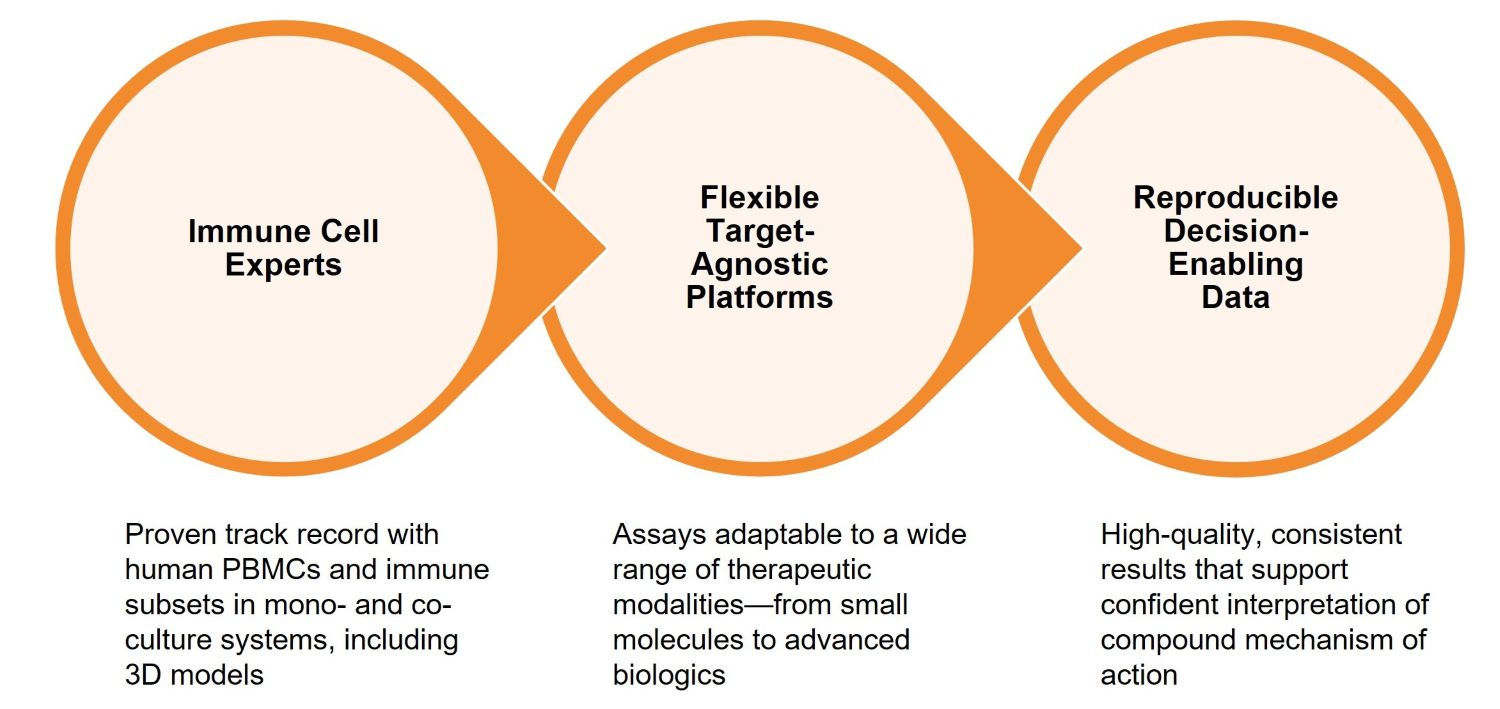Cell-Based Assays
In vitro assays for drug discovery: rapidly translate your promising lead into a clinically ready candidate

How do cell-based assays provide predictive and reliable data in drug discovery?
Cell-based assays are essential tools in modern drug discovery and development, providing critical insights into cellular function, toxicity, proliferation, and signaling. By using physiologically relevant in vitro models, including immortalized cell lines, primary human cells, and iPSC-derived 2D and 3D systems we can help you generate predictive, reliable data that guides decision-making and reduce development risk.
In vitro assays: from target to clinic
Cell-based assay development services
At Concept Life Sciences, we provide customized, science-led, consultative cell-based assay development services, designed around your therapeutic goals. Whether you are evaluating new targets, refining early-stage hits, or characterizing clinical candidates, our services help you:
- Accelerate discovery with reliable, data-driven results
- Confidently validate targets and mechanisms of action
- Deliver meaningful insights that drive clinical progress
- Maintain quality and budget control throughout your project

Why choose Concept Life Sciences for assay development?
Your trusted partner in immune cell assay development

Tailored assays for better translational outcomes
You need clear answers to progress your candidates therapeutic potential to move forward with confidence. We design assays to meet your specific goals, ensuring results are
- Target- and modality-agnostic
- Adaptable to your specific biology and mechanism
- Compatible with complex or emerging drug modalities
Flexible assay platforms and technologies
Our cell-based assays use a variety of systems to mimic human biology:
- Immortalized cell lines
- Primary human cells
- iPSC-derived cells
- 2D and 3D culture systems
Advanced technology capabilities
Reliable, reproducible data is critical to drug discovery. When precision and speed must go hand in hand, scaling assays without compromising quality becomes critical. At Concept Life Sciences, there is a wide breath of technologies that at your disposal, giving us the flexibility to select the most appropriate readout for each assay, including:
✔ Flow Cytometry
✔ Analyte Detection
✔ Protein Detection
✔ Live Cell Imaging
✔ High Content Imaging
✔ Gene Expression Analysis
Learn more about our custom assays and tailored molecular biology services and download the immuno-oncology brochure
Assay applications by research phase

Comprehensive services to support your journey
Every result drives you closer to your next breakthrough and by crafting customized assays for our clients, we are able to support you with the highest demands of pharmaceutical and biotech research and development.
- Target identification – see our AI-guided approach
- Target validation
- Compound screening – screening services
- Target engagement assay services
- Mechanism of action studies
- Cell health and proliferation assays
- Functional assays
- 3D and ex vivo model-based assays
Cell based assays FAQs
Q: What are cell-based assays?
A: Cell-based assays are in vitro tests that evaluate biological responses in live cells to measure drug safety, efficacy, or mechanism of action.
Q: What types of cells do you use?
A: We work with immortalized cell lines, primary cells, and iPSC-derived cells, depending on your study goals.
Q: How do 3D models improve predictability?
A: 3D models replicate tissue architecture and cellular interactions better than 2D models, resulting in more physiologically relevant data.
Partner with us
From discovery through development, our cell-based assay expertise will work with you to make smarter, faster, and more confident decisions.
Let’s collaborate and unlock the full potential of your candidate — together.
Contact a biologist today to discuss your project and let us provide the customized solutions you need to succeed.




